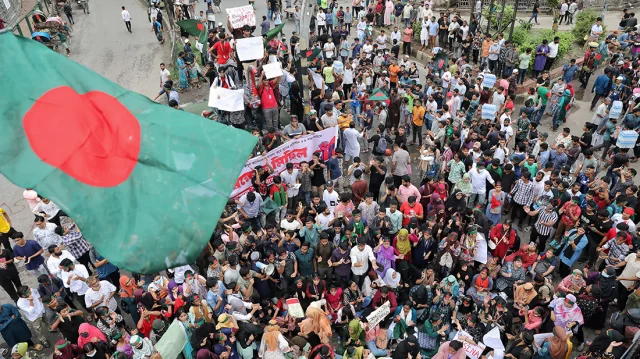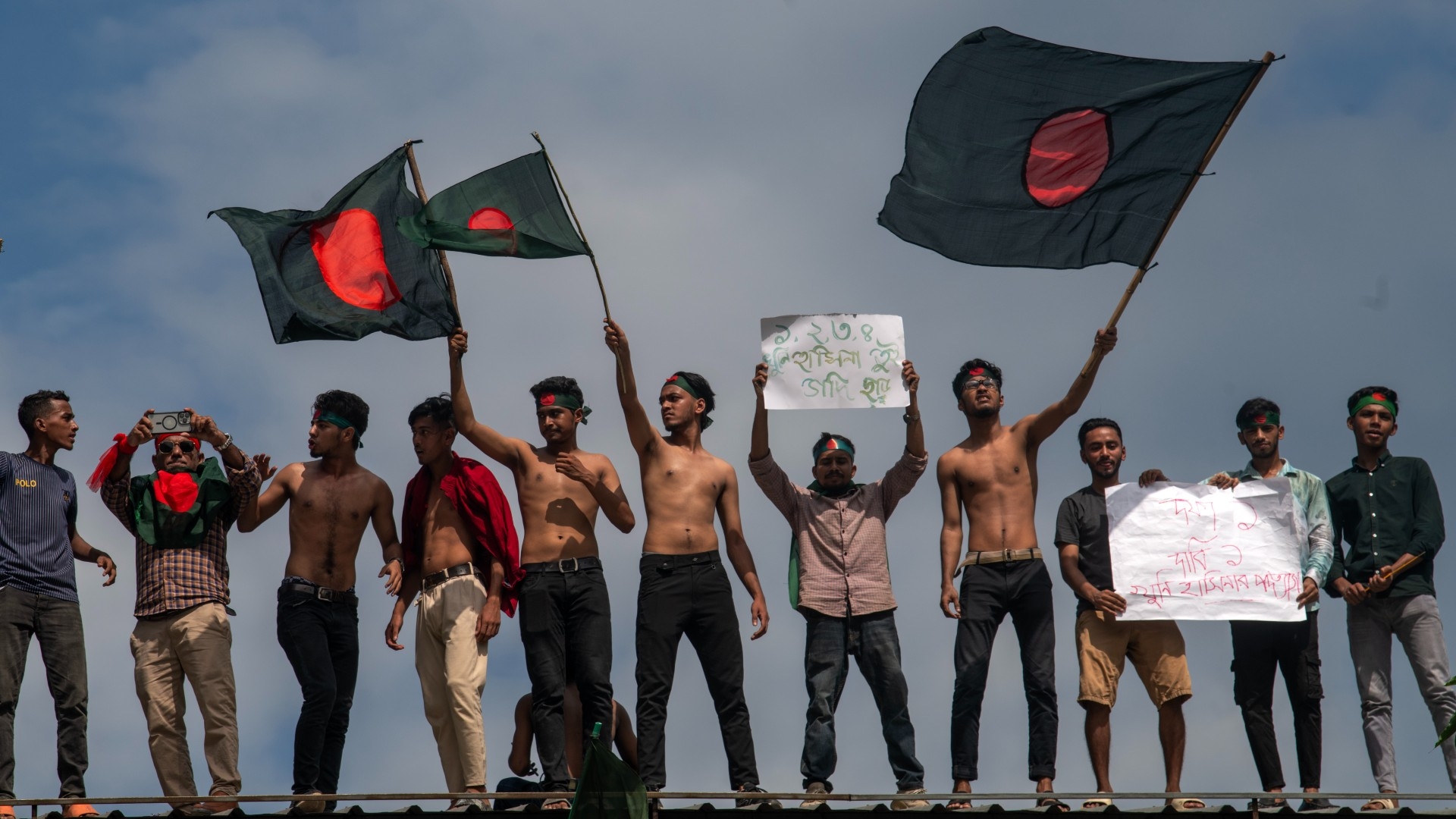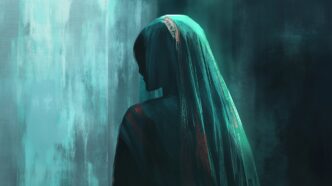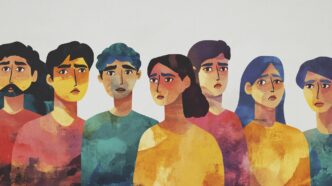This article was co-written by Tuba Rahman and Ashfaq Amin.
Under Sheikh Hasina’s autocratic tenure, Bangladesh witnessed a negative shift in its digital space—one that had increasingly become a critical tool of repression rather than a platform for free speech. For the past 16 years, Bangladesh found itself in the strangling grip of self-censorship, a time when speaking out could cost livelihoods—or worse, lives. The pervasive atmosphere of fear and intimidation led many to muzzle their voices, choosing security amongst chaos over the dangers of dissent. The constant threat of legal retribution, harassment, or worse, loomed over anyone who dared to criticize the ways of the Awami League. Unabashed weaponization of the law, law enforcement forces, and judiciary are just some of the ways her government used to suppress dissent and restrict free speech both online and offline.
Looking back, one might wonder how it was possible for an autocratic regime to continue its unlawful absurdity for more than 16 years at a stretch without any significant resistance in the first place. One of the reasons for the widespread prevalence of crippling hesitancy to speak up is that it is built from innumerable examples. The inhumane consequences of fearless individuals reminded the general populace to bite their tongues whenever they felt the slightest impulse to raise their voices.
To understand better, let’s take a look at one of the oldest mysteries of such brutalities during the Awami regime: The case of Bangladeshi journalist couple Sagar Sarowar and Meherun Runi, one of the most high-profile and controversial murder cases in Bangladesh.
Sagar Sarowar, a news editor at the television channel Maasranga, and his wife Meherun Runi, a senior reporter at ATN Bangla, were brutally murdered in their Dhaka apartment on February 11, 2012. Despite numerous promises by authorities, the investigation has dragged on for years with little progress. The police initially detained several suspects, but no conclusion has been reached till today.
The aftermath of the incident, like the ones of every atrocity by our former government, was dealt with an iron hand where no one dared to challenge the authenticity of the never-ending investigation. However, there were hushed rumors about the couple being involved with a report on one of AL’s many kleptocratic propaganda as their last project.
Recent research claims the case to be a well-devised plan and targeted attack backed by the government itself. Mainul Islam, a freelance journalist and activist, states Rumi was working on a project exposing the darker side of Summit Group, one of Bangladesh’s largest conglomerates.
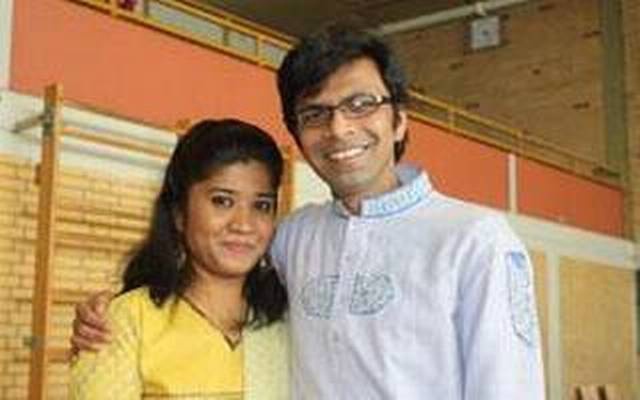
Another similar example is the story of Abrar Fahad, a second-year student at Bangladesh University of Engineering and Technology (BUET). He was brutally murdered on October 7, 2019, a case that sparked nationwide outrage and highlighted issues of campus violence and political repression in Bangladesh.
He was killed by members of the Bangladesh Chhatra League (BCL), the student wing of the ruling Awami League party, who accused him of being involved in anti-government activities after he posted a status on Facebook criticizing the government’s water agreement with India and other issues. The murder led to widespread protests across the country, particularly among students, who demanded justice for Fahad and an end to violence on campus.
In December 2021, a Dhaka court sentenced 20 of the accused to death and five others to life imprisonment for their roles in Fahad’s murder as mere scapegoats in response to the outrage.
A decent piece on the practice of free speech in BD would only be complete by mentioning Mushtaq Ahmed. A Bangladeshi writer and commentator, Mushtaq became a prominent figure in a case that attracted significant domestic and international attention. He was arrested in May 2020 under the DSA (Digital Security Act). The charges against him stemmed from his social media posts, which were critical of the government, particularly its handling of the COVID-19 pandemic.
Tragically, Mushtaq Ahmed died in custody on February 25, 2021, after spending nearly ten months in pre-trial detention. Many saw his death as a symbol of the risks faced by those who challenge authority in Bangladesh, and it intensified the debate over the law’s impact on freedom of expression in the country.
In 2015, several news websites, including bdnews24.com and Dhaka Tribune, were temporarily blocked for allegedly publishing “anti-state” content. In early 2023, the Bangladesh government blocked Netra News, an online news portal known for its work on enforced disappearance and its coverage of “Aynaghor.” Newspapers like Prothom Alo and Daily Star faced severe legal backlashes and obstacles from the government due to their critical reporting, including an investigative report by Prothom Alo on corruption being temporarily blocked in 2018. The suspension of ATN News’ broadcasting license and the forceful shutdown of Jamuna TV and many other media houses hold similar stories.
During political unrest, such as the 2018 student protests, the government shut down access to social media platforms like Facebook, WhatsApp, and YouTube to prevent the spread of “rumors” and “misinformation.”
The throttling of internet speed, which made it painful to consume media, and the shutdown of mobile internet for eleven days and broadband internet for five days are just some instances where press freedom was unlawfully forced to subjugate at the time of the recent student protest.
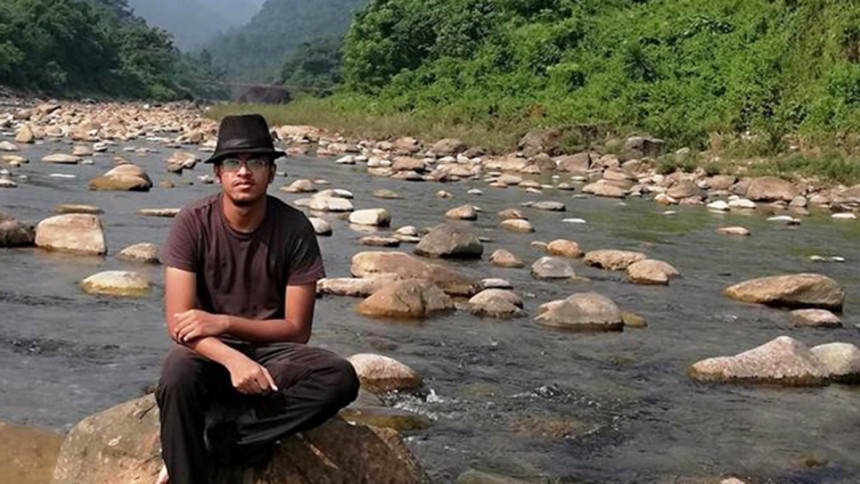
Surveillance in Bangladesh subsequently became more pervasive. Deep Packet Inspection (DPI), a technology that examines data packets across the internet, was implemented to monitor web traffic. This means It can reveal detailed information about what people do online, such as the sites they visit and the content they access. Moreover, sophisticated equipment was used to block websites critical of the government. The National Telecommunication Monitoring Center, formed by DGFI, acted as the hub for these operations. The people loyal to the regime were posted in top positions at the organization. They monitored phone calls, text messages, emails, and internet usage. The NTMC allegedly helped the government monitor and suppress opposition by analyzing this data. There have been accusations that opposition leaders and even business people were blackmailed with threats to leak their private audio calls. The organization’s director general, Major General Ziaul Ahsan, was recently sacked from the army and has been detained by the police.
The biggest weapon this brutal regime had against free speech was undoubtedly the Digital Security Act. The predecessor for this act was the ICT Act of 2006. The ICT Act initially intended to promote the development of Bangladesh’s information technology sector. However, the 2013 amendment to the law significantly broadened its scope, making it a tool against free speech. The act was poorly written from the start, making it susceptible to abuse.
The most controversial provision was Section 57, which criminalized the publication of anything that was deemed to be “false,” “obscene,” “defamatory,” or “tends to deprave or corrupt” its audience.
Violations could result in up to 14 years in prison—an absurdly severe punishment, considering that the penalty for attempted murder is the same. The government frequently used the law to target journalists, bloggers, and social media users who were critical of the government. According to Human Rights Watch, more than 1,300 cases were filed under Section 57 between 2013 and 2018, many facing lengthy pre-trial detentions. This brutal weaponization of the act led to international criticism. In response to growing criticism, the regime introduced the Digital Security Act (DSA) in 2018 to address the misuse. However, the DSA retained many of the controversial provisions of the ICT Act while introducing new ones that further expanded the government’s power to regulate online content. Section 25 of the DSA criminalized the publication of “false or offensive information,” punishable by imprisonment of up to three years. This provision has been used against journalists and activists for posts on social media. Section 28 criminalizes any content that “hurts religious sentiments,” which has been used to target secular bloggers. Section 29 allowed for punishment of defamation in digital media with imprisonment of up to three years, which has been criticized for stifling journalistic freedom. The act was again amended in 2023 to clarify its provisions, although there were calls to cancel the controversial parts. The most contentious sections still remained susceptible to abuse. Despite facing severe criticism from the opposition, the law was passed nonetheless.
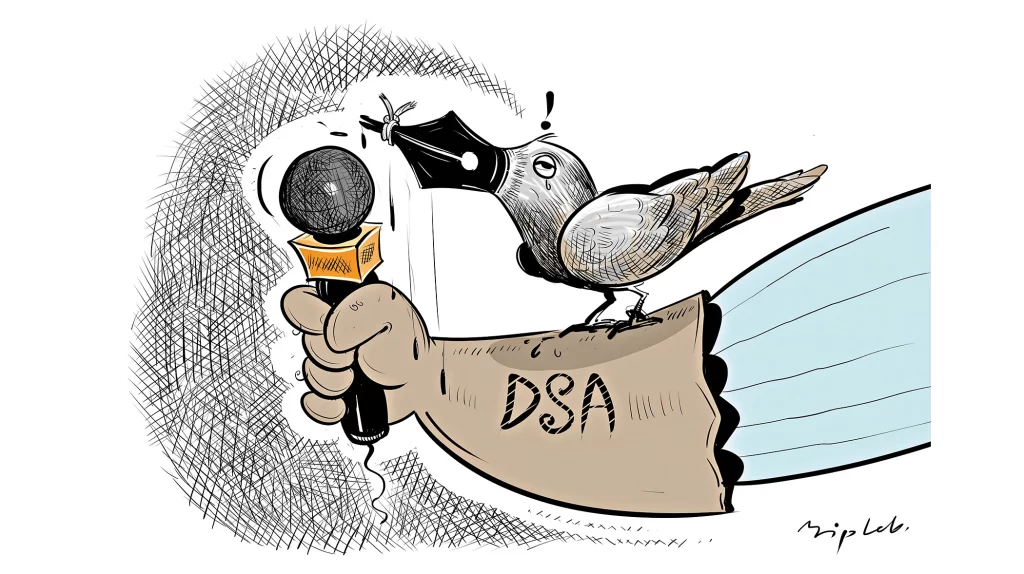
These practices have adversely affected Bangladesh’s position in global rankings related to freedom of expression and press freedom and drew widespread international condemnation. Bangladesh was ranked 163rd out of 180 countries by Reporters Without Borders in 2024. Additionally, the United Nations Human Rights Council expressed concerns about the usage of Digital Security Act (DSA) to suppress freedom of expression and called on the Bangladeshi government to ensure that its laws align with international human rights. Due to diplomatic pressure and criticism by international human rights organizations such as Human Rights Watch, Amnesty International, and Reporters Without Borders, the number of cases under DSA decreased significantly—however, many cases kept being reported.
The AL regime was not content to simply let fear linger in the background; it actively cultivated this environment through a range of fear-mongering tactics designed to keep the population in check. Independent media outlets were marginalized, and journalists who stepped out of line faced threats, job loss, or worse. Government-sponsored propaganda painted a rosy picture of the regime’s achievements while downplaying or outright ignoring any negative news. This one-sided flow of information was designed to keep the populace complacent and uninformed.
Media outlets avoided publishing stories that could be deemed controversial.
This self-censorship stifled free speech and eroded public trust in the media, as people increasingly saw news outlets as mouthpieces for the government rather than independent watchdogs. Activists and opposition figures were often followed, harassed, or intimidated, their every move scrutinized. Arbitrary arrests, monitoring of social media, and private conversations nurtured a sense that Big Brother was always watching, leading the general public to practice self-censorship on their own. All these were systematically run to foster a single clear message: Dissent is not an option.
Therefore, people began to second-guess their words, and silence became the norm. Even on social media, where anonymity might offer some protection, users were careful about what they posted/shared, often resorting to coded language and masked satire or staying silent on politically sensitive issues. The sense that you couldn’t trust even your closest friends with your honest thoughts was ever-present. People were forced to navigate a reality where every expression of dissent was a potential threat, leading to a society where caution and silence became survival strategies. Private phone calls and texts took place with just as much awareness, leaving in-person interaction in the privacy of one’s own house the only reliable way to vent all these pent-up frustrations. Once vibrant and open, conversations about politics and governance became hushed or avoided altogether.
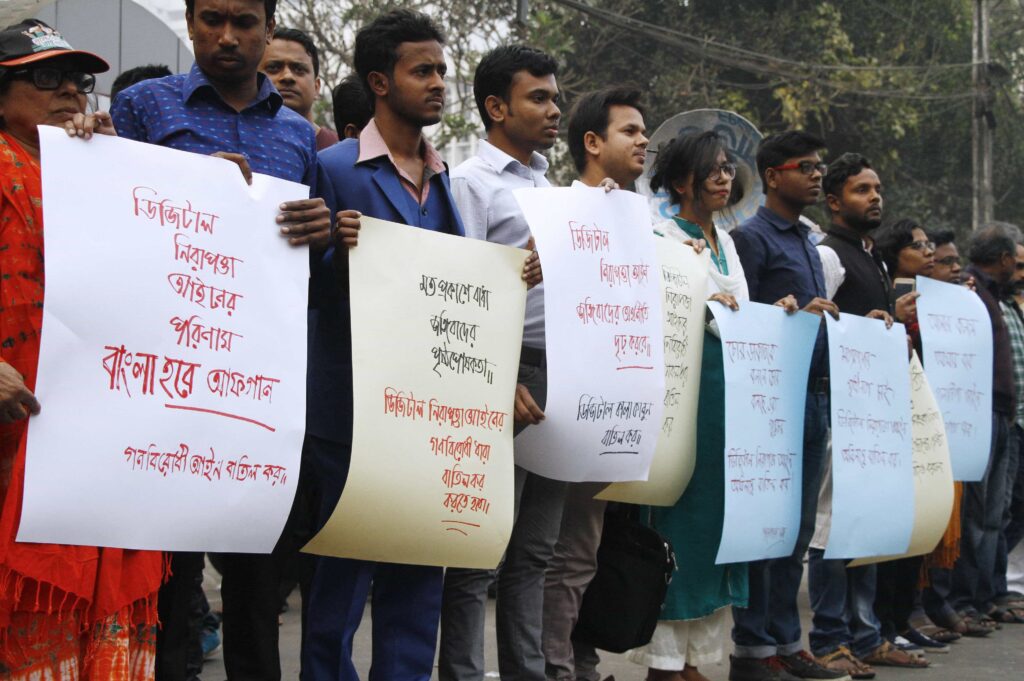
These 16 years’ worth of bottled anger, exasperation, and feeling of being violated started to spill from July 15 and reached an even larger scale all over the country on July 18. Although it began with a quota movement by the students, it soon took a different turn where people from all walks of life joined hands. The atrocities by the government also kept on exponentially peaking as the outrage started to achieve heights, but opposed to the government’s prediction; this only pushed everyone exhausted from years of silence to raise their voices even higher. Hence, even before the regime officially fell, the cracks in its oppressive structure had started to show, and we began to exercise our voices in ways that would have been unthinkable just a few years earlier.
Public spaces became arenas of expression, where graffiti and street art flourished as symbols of defiance and creativity.
Social media platforms buzzed with debates and discussions, no longer stifled by the fear of surveillance or arrest, although they were happening more frequently than ever. This new, dare-devil attitude of the mass populace is what ultimately threw a 16-year-old fascist regime off of its undeserved throne.
Once the AL regime crumbled, we stood at the threshold of a new reality, where the right to free speech was no longer a distant dream but a tangible part of our daily lives. This transition, though exhilarating, required us to adjust to a life free from the suffocating grip of censorship. The student movement that had been the spark of this transformation played a crucial role in helping us navigate this new landscape. These young activists, who had faced the regime’s fear tactics, showed us that the power to speak out was not just a privilege but a fundamental right. The immediate rejection of any attempts to impose martial law or other undemocratic measures was a clear sign that the old ways would no longer be tolerated. We had learned the hard way what it meant to live in fear. For the first time in years, we had a genuine say in how we wanted our country to be governed. However, this independence came with its very own challenges.
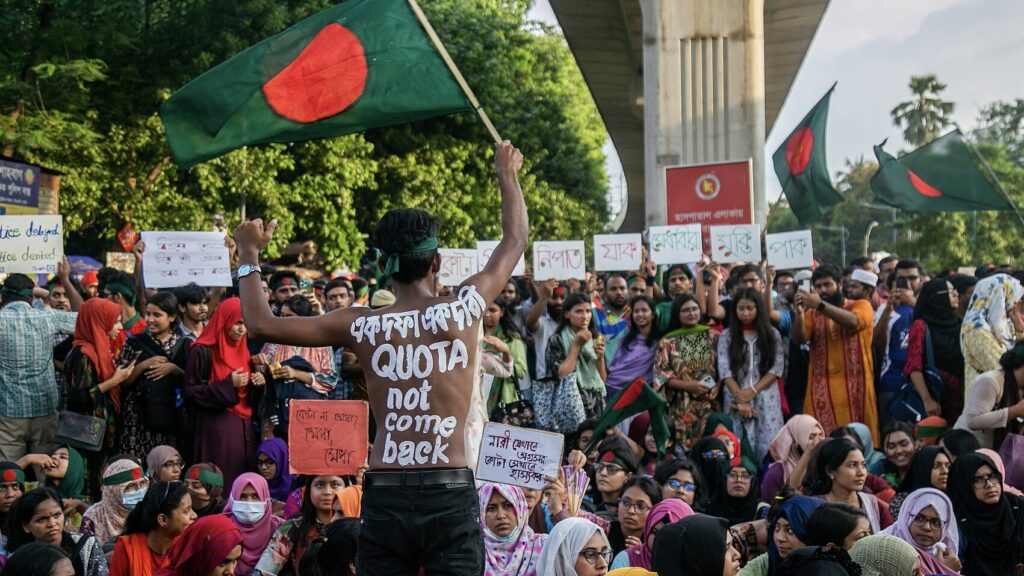
Hours after the announcement regarding the formation of the Interim Government on the fall of the infamous Awami regime, chaos, including communal riots, kidnapping, and vandalism, spread across the country. Although a majority of it consisted of infuriated civilians attempting mob justice on influential Awami leaders by taking advantage of the power vacuum, a significant portion of it was an abhorrent act staged by AL to cause mass unrest for tarnishing the image of a “Hasina-free” Bangladesh to the international media. Despite that, the general public utilized their newly found right to free speech to take quick hold of the situation as effectively as possible.
Perhaps in this new era, the most significant change has been the surge in political awareness, particularly among the youth. Political apathy, once widespread, has given way to a culture of activism and involvement. Inspired by the student movement’s successes, young people began to organize, debate, and vote in ways that would have been unimaginable before. But it isn’t limited to the youth. People who once felt powerless or indifferent are now participating in the political process, driven by the understanding that their voices truly matter. Starting from institutions such as the NBR (National Board of Revenue), Bangladesh Bank, and the ACC (Anti-Corruption Committee) to all major universities, people are speaking up against their corrupt authorities.
The interim government, though temporary, is under constant watch.
Every decision, every policy, is scrutinized by a populace that has rediscovered its voice. Public forums and social media are still alive with discussion. The coordinators and officials who are leading this interim period know that they are being held to the highest standards, with no room for the corruption or abuse of power that once went unchecked. Mass awareness, like a stubborn wildfire, is refusing to burn out.
As we move forward, the lessons of the past remain alive in our minds. We know the price of silence and we understand the power of our collective voice. Names like Abu Sayed, Farhan, Mugdho, and countless others were the prize we had to pay to be able to live and not just survive. They have liberated us and opened the door to a future where freedom of speech is both a right and a responsibility. Now, we must prove ourselves worthy of this victory, protecting the promise this new beginning makes.
